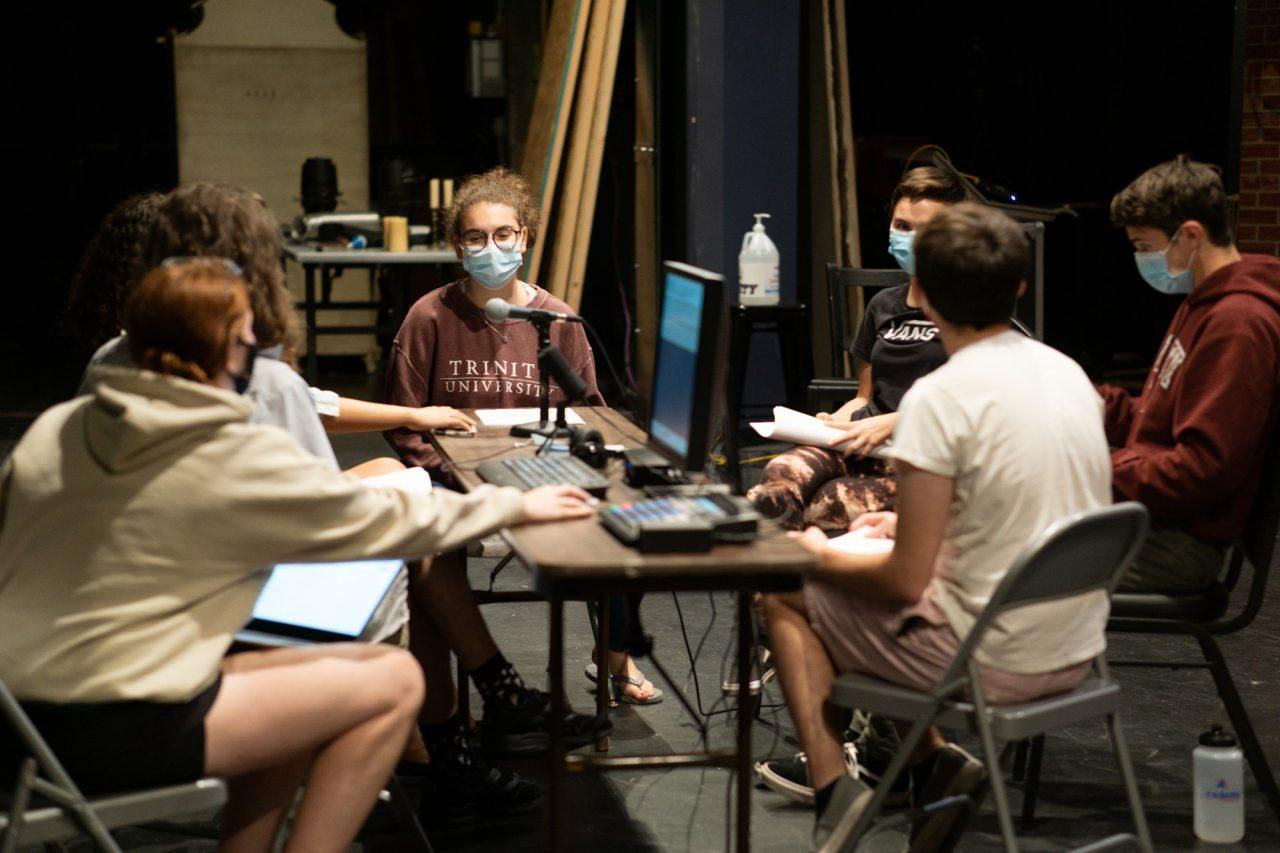photo by Kate Nuelle
“The first day of rehearsal, we were told that theatre is live; this is not live, so this, what we are doing here, is not theatre,” said sophomore Nathan Mihalski.
On a fundamental level, acting is based on facial expressions, speaking and body language, so what do you do when two of those are taken away? This question has shaped how Trinity theatre students operate under the direction of Roberto Prestigiacomo, associate professor of theatre, as they rehearse “Gaia.” Based entirely on student writings and ideas, “Gaia” was initially pitched during the spring semester and planned to debut in the fall. As with everything else on campus, however, what was planned for “Gaia” drastically changed because of the pandemic.
“The entire concept had to be reworked to be something that we could take advantage of,” said first-year Caitlin Huisman.
Fortunately, because “Gaia” is an original work based on student writings with Prestigiacomo’s assistance, those involved have had the freedom to adapt the source material to their needs without the pressure to stick to a strict script or production notes. “Gaia” has been able to evolve with the times.
“When ‘Gaia’ was initially pitched, it was as a live performance on the stage. The idea of creating a video is something that came later,” said sophomore Juliana Martinez.
While originally meant to include more traditional, dialogue-based scenes, “Gaia” will now consist of a single actor performing on stage as another student performs a voice over. This change alone presents formidable challenges.
“Channeling a character or an emotion without somebody to bounce off of is interesting and definitely something that I had to practice,” said sophomore Patrick Green.
“It’s definitely a different experience,” said first-year Gabriella Stein. “You have to flex that one muscle rather than all the muscles of your body or your voice.”
On top of that, the actors are still required to wear face masks during the onstage performance, which has taken away much of what the students rely on to convey emotion during a scene.
“You just need to be way more aware of your body, and you need to be so much more attached to it,” said Huisman. “Because you cannot act at all with your face, you just have to be so much more aware of what your body is doing.”
The face masks the actors will be wearing while performing have also undergone changes. As opposed to just wearing regular cloth face masks, Prestigiacomo and the students have done careful research and brainstorming to design masks that will work within the concept of the show in order to make them feel organic.
“Initially we had hoped that we’d be able to film without masks because that would make it a lot easier,” said sophomore Josh Rea. “But once we realized we’re going to have to have our masks, that’s when we started incorporating an extra depth to the mask, like giving it a purpose.”
Face masks are also required while students record their voice-overs.
“I found that I have to really focus on my dictation and how I’m saying things because it’s coming out a mask, so I have to be really careful,” Green said.
While the production of “Gaia” has not been easy, the students involved feel that there have been inadvertent benefits to the changes that have been made. Most of the students, for instance, are doing voice overs for the first time. They are even incorporating other types of art such as animation that they wouldn’t have been able to utilize if it were a live performance.
“It’s really interesting for us to participate in because all these people are thinking of traditional theatre, and then we come in, and it’s almost like we’re edging towards film, which is just a completely different experience,” Rea said.
“It’s neat because we’ve gotten to do things like not deliberately memorizing anything. When you memorize something, you fall into a particular cadence with it,” Martinez said. “But you can voice record with the script in your hand and that lets it have more of an organic feel to it despite a more artificial construction.”
According to Huisman, the students felt excited that they were able to be exposed to so many different aspects of acting and production that they would not have had the opportunity to learn in a traditional live performance.
“Acting for film and acting for stage are very, very different techniques,” Huisman said. “Most people are trained for stage before you’re ever considered for camera, so we very much had to kind of exercise these new muscles that are not typically used at the collegiate level.”
“Gaia” will be uploaded online on Oct. 2.







